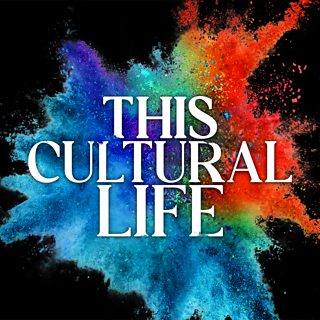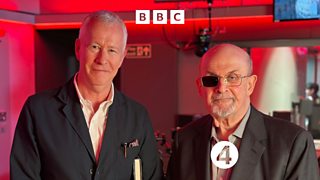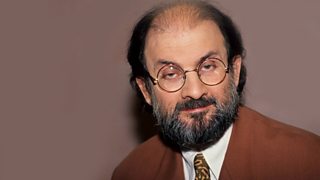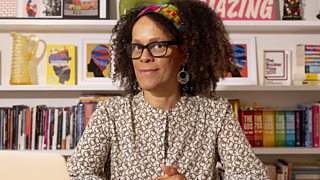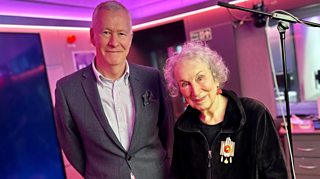Salman Rushdie: Nine things we learned from his This Cultural Life interview
Salman Rushdie is one of the world’s most successful writers, with 23 books to his name and a Booker Prize for his novel, Midnight’s Children. His 1988 novel The Satanic Verses had an unimaginable effect on Rushdie’s life when Ayatollah Khomeini, the leader of Iran, issued a fatwa against him, calling for his death for blasphemy. It forced Rushdie into hiding for years. In 2022, Rushdie was attacked in New York, sustaining life-changing injuries. He has now written a book, Knife, about the incident. In this episode of This Cultural Life, he tells John Wilson all about his extraordinary life. Here are nine things we’ve learned.

1. He learned storytelling from his parents
Salman Rushdie was born in Bombay, India. His father was a lawyer turned businessman, and his mother a teacher. He says they gave him his gift for storytelling. “Both my parents were good at it, but they had different kinds of stories,” he says. “My dad would tell us, as little children, his versions of Arabian Nights stories… Aladdin And The Wonderful Lamp, or Ali Baba And The Forty Thieves”. He describes his mother as “a world-class gossip… Like all world-class gossips, she couldn’t resist telling you.”
2. He first encountered racism at school in England
At the age of 13, Rushdie moved to England to attend Rugby School. Leaving India was his choice, but he says he “really didn’t have a good time” at Rugby. “It was the first time in my life that I’d been made to feel, not exactly like an outsider, but like an ‘other’,” he says. “I was foreign and that was not good. I was really bad at games, which was extra not good. And there were bits of racism.” That included abusive graffiti and someone tearing up his work. “That was hard to deal with.”

3. Advertising taught him how to be a writer
Before he became a novelist, Rushdie worked as an advertising copywriter, on campaigns for fresh cream cakes (“Naughty but nice”) and Aero (“Irresistibubble”), among others. “It gave me real discipline,” he says. “You can’t wait for the muse to descend. If the client is showing up at 2.30 on Thursday, you’ve got to be ready… It gave me that discipline to treat writing as a job to get done.”
4. He's frustrated that The Satanic Verses was overshadowed
It really didn鈥檛 ever occur to me that anything on the scale of what happened would happen.Rushdie on the controversy surrounding The Satanic Verses
Shortly after The Satanic Verses was released in 1988, the fatwa issued by Ayatollah Khomeini became headline news. A magical realist tale, the book includes dream sequences, one of which concerns a character and events that echo some of the traditional accounts of the experiences of the Prophet Muhammad. The book became highly controversial, in a way Rushdie resents. “It gave people the wrong idea of the kind of book that it is,” he says. “I still think that it’s my novel about London, but that’s not how most people would think of it. The religion part – the dream sequences – are a relatively small part of this quite big novel. It’s two chapters… It really didn’t ever occur to me that anything on the scale of what happened would happen.”
5. New York freed him as a writer
The fatwa meant Rushdie had to live in hiding in the UK for around a decade. He eventually moved to New York, which made a world of difference to his life as a writer. “It took away any negative pressure,” he says. “In England, in those years of police protection, that was really very stressful to put that aside and write a book. In New York that just wasn’t there. It was easier to go back to being the person I always thought I’d been.”

"It turns out that I'm tougher than I thought"
Salman Rushdie talks to John Wilson on 成人快手 Radio 4's This Cultural Life.
6. He's a medical miracle
In 2022, Rushdie was about to deliver a talk at the Chautauqua Institution in New York when he was suddenly stabbed multiple times by an attacker. “I am surprisingly well,” Rushdie says when John Wilson asks how he is. “I surprised myself, and I think I also surprised the medical profession.” He lost the sight in one eye and partial use of one hand. “I’ve recovered better than expected. I remember, for example, the hand specialist saying that given the extent of the injuries it’s really amazing that my hand has recovered as it has. I think I’m what they call a medical miracle.”
7. He doesn’t like writing about himself
Rushdie writes about the attack in his new book, Knife, a series of imagined conversations with the person who stabbed him. He doesn’t relish writing about personal experience. “When I first thought about becoming a writer, the last thing on my mind was to write about myself,” he says. “I had absolutely no interest in doing that. I wanted to make things up… Now I’ve written two books about myself [the other is Joseph Anton: A Memoir] and that’s more than enough.”

8. He's a frustrated actor
I鈥檓 fortunate that I have a sense of humour. I think that humour, in a way, is an answer to fanaticism.Salman Rushdie
After living in hiding, Rushdie says it was essential for him to be visible while living in New York, to reclaim his existence. He became very visible by making cameo appearances in things like Bridget Jones’s Diary, and the sitcoms W1A and Curb Your Enthusiasm. He says there was an ulterior motive there. “I’m a frustrated actor,” he laughs. “It’s the only other thing I ever wanted to do.” He says comedy is an essential part of retaining normality. “I’m fortunate that I have a sense of humour. I think that humour, in a way, is an answer to fanaticism. It’s difficult to imagine a funny fascist. And humour – laughter – is a thing we do together. It’s important.”
9. He's tougher than he thought
Wilson notes how upbeat Rushdie is, despite all he’s experienced. He says it’s not a choice. “I think I discovered I was more resilient than I believed myself to be. If you’d told me in advance, ‘The following things are going to happen; how do you think you’ll deal with them?’, I would not have bet on myself to do that well. But turns out I’m tougher than I thought.”
More from 成人快手 Radio 4
-
![]()
This Cultural Life: Salman Rushdie
Listen to the full interview on 成人快手 Sounds.
-
![]()
Desert Island Discs: Salman Rushdie
Sue Lawley's castaway is writer Salman Rushdie.
-
![]()
Bernardine Evaristo: Nine things we learned from her This Cultural Life interview
The Booker Prize winner on overcoming bad relationships and her key technique for success.
-
![]()
Margaret Atwood: Nine things we learned from her This Cultural Life interview
The Handmaid's Tale author talks about her fascination with dictators.
